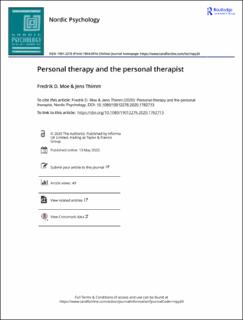Personal therapy and the personal therapist
Journal article, Peer reviewed
Published version

Åpne
Permanent lenke
https://hdl.handle.net/11250/2728849Utgivelsesdato
2020Metadata
Vis full innførselSamlinger
Sammendrag
Personal therapy has been proposed as an aid in promoting the professional development of psychotherapists by increasing their self-awareness, self-reflexivity, and self-knowledge of the therapy process and of personal characteristics. Psychoanalysis/psychodynamic therapies, cognitive-behavioral therapies, humanistic/experiential therapies, and systemic/family therapies argue that working with the personal and professional self of the therapist is valuable in this respect. The objective of the present study is to summarize the theoretical and empirical literature on personal therapy and its effects on the professional development of therapists and on patient treatment. A systematic review of the literature was conducted and demonstrated a convergence between reported benefits from personal therapy and therapist qualities. Psychotherapists have rationales (e.g. improvement of emotional and mental functioning and a better understanding of the dynamics between therapist and patient) for attending personal therapy, and self-report studies indicate that they experience benefits related to the important characteristics of effective therapists (e.g. empathy, genuineness, formation of a working alliance). Studies of personal therapy and therapist development find no causal connection or correlation with or effects on patient treatment. However, these studies exhibit methodological weaknesses, such as inadequate controls and small sample sizes, making conclusions equivocal.
